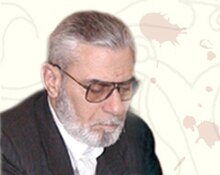Ezzedine Salim
| Ezzedine Salim عزالدين سليم |
|
|---|---|
 |
|
| President of the Governing Council of Iraq | |
|
In office 1 May 2004 – 17 May 2004 |
|
| Preceded by | Massoud Barzani |
| Succeeded by | Ghazi Mashal Ajil al-Yawer |
| Personal details | |
| Born | 1943 Basra, Iraq |
| Died | May 17, 2004 (aged 61) Baghdad, Iraq |
| Political party | Islamic Dawa Party |
| Religion | Shia Islam |
Ezzedine Salim, (Arabic: عزالدين سليم), also known as Abdelzahra Othman Mohammed (1943 – 17 May 2004, عبدالزهرة عثمان محمد), was an Iraqi politician, author, educator, Islamist theorist and one of the leading members of the Iraqi Dawaa Movement between 1980 and 2004.
Author of over 50 books, including history, Islamic events and works on education, he is best known in the Muslim world for his work on what he believed to be the social and political role of Islam, particularly in his book Political Opposition in the experience of Imam Ali(as). His magnum opus, Fatima Bint Muhammad, is a high calibre commentary on the life of Fatima, the daughter of Islamic prophet, Muhammad.
Born in the city of Basra, Salim began studying religion and politics at a young age. At the age of 19 he joined the Shiite group Islamic Dawa Party, whose members were quickly noticed by the Baath Party as a threat to their power. He left Iraq in his early twenties to go and live in Kuwait.
After a short time in Kuwait, he went to Iran where he began his career as an editor in many newspapers as well as his main job in the SCIRI (Supreme Council for the Islamic Revolution in Iraq). During his stay in Iran, he gained recognition as a Mujtahid (a high-ranking Islamic scholar). He wrote over 100 books covering topics ranging from religion to politics.
Salim headed the Daawa al-Islamiyah ("Invitation to Islam") party, an Islamist party officially being referred to (in 2004) as Daawa Islamic Party. Known as a writer, philosopher, thinker and political activist, he started his political party as a vehicle to coordinate opposition against Saddam Hussein. The party was quickly recognized as a strong anti-Saddam group. It gained many supporters over the years, and became respected not only in Iraq, Iran and the Middle East but throughout the world. Salim survived numerous assassination attempts by Saddam's followers, and deliberately changed his name to avoid being tracked.
...
Wikipedia
